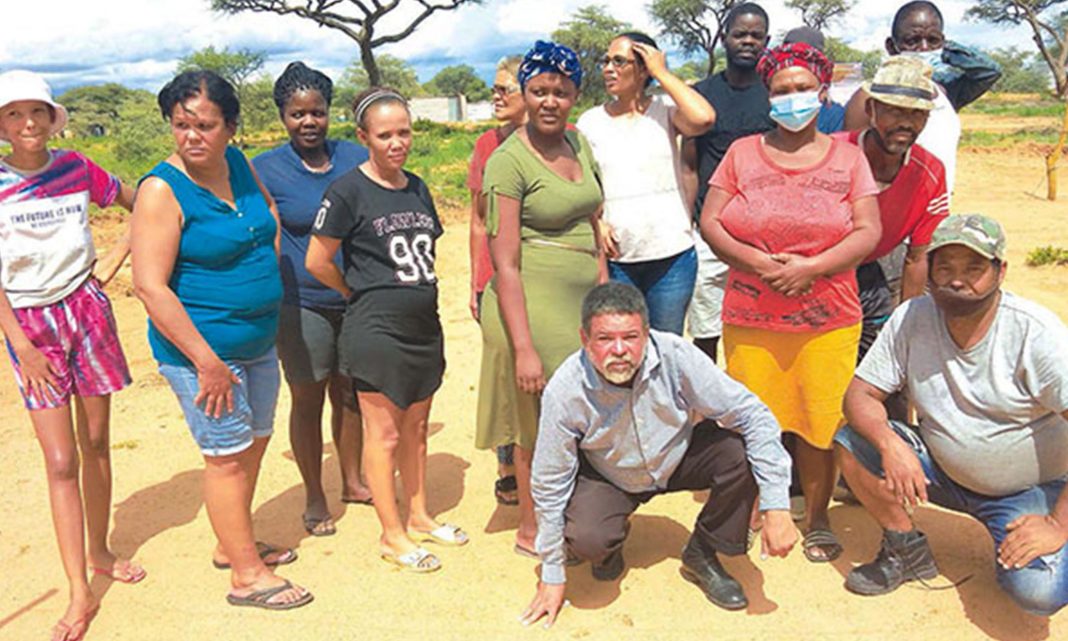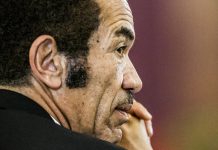By Charlotte Nambadja | 04 March 2021
RESIDENTS of Nossobville at Gobabis have been grabbing land on a plot next to a local cemetary illegally amid exorbitant house prices and a waning economy.
They are calling their makeshift home “Onsville”, which is Afrikaans for “our place”.
Nossobville resorts under the Kalahari constituency and is home to about 70 households.
Gobabis-born Wallace Finnies (46) says he still lives in his mother’s shack, because he cannot afford a place of his own.
He claims he knows of a Zimbabwean national who owns land and has built apartments in the area, while Namibians are still struggling to secure land.
“There is corruption at this town. We feel left out, and only other locations at the town are catered for. This location is not part of the Gobabis constituency … our constituency office is about 30 km away,” Finnies says.
“There is serviced land at Nossobville; why are we not placed there?” he asks.
Finnies says some people at the town own more than one plot, yet Nossobville residents remain landless.
“There are no jobs; work is being given to the Chinese, while Gobabis has contractors who can be hired to do the same work. Enough is enough,” he says.
The population of Gobabis is growing steadily.
According to the latest census report, the town accommodated 68 039 people in 2001, a number which grew to 71 233 in 2011.
The shack dwellers say there is serviced land at the area intended for the construction of affordable houses, complete with drainage systems, street lights and electrical boxes.
This land, however, has been undeveloped for over four years, they say.
Esmerelda Eises (27) says: “We came to grab land, because we are tired of living in overcrowded houses, and want a place to call home.”
Eises’ neighbour Carmen van Roye (46) says their circumstances are too much to endure.
“We are without toilets and electricity. We too are human,” she says.
‘CORRUPTION INVESTIGATED’
Omaheke governor Pijoo Nganate says claims that his office does not meet with residents are false.
He says he has met with the Nossobville Development Community twice.
Nganate says the community should meet with their local authority and constituency councillors, as his office only meets with them on invitation or through their constituency councillor. He says he is not aware of decisions made on the allocation of land.
“I also have no platform to make such decisions.”
He says he cannot confirm allegations of Zimbabweans owning land or residents owning more than one erf, adding that only the municipality is in a position to do so.
He, however, admitted that allegations of favouritism and corruption are being investigated.
“If the community has proof of such [favouritism and corruption], they must take it to the Anti-Corruption Commission (ACC) or the ombudsman,” Nganate says.
He says water and electricity will be provided to the community when funds are available.
The already serviced land lying idle involves a joint venture between the municipality and the community, he says.
“This issue was raised with the former council and with the newly elected council, and will get due consideration,” the governor says.
Frederick Ueitele, the spokesperson of the Gobabis municipality, says residents should approach agencies such as the ACC with proof of corruption and favouritism for action to be taken.
SERVICED PLOTS
He says there are 21 fully serviced plots at Nossobville, which are part of the 200 plots reserved for the Ministry of Urban and Rural Development’s low-cost housing project, supported by the Chinese government.
“Towards the end of 2020, ministry officials came to verify the existence of these erven, as the project that is exclusively for Gobabis and Grootfontein will become a reality soon, and residents must be patient,” he says.
Ueitele denies that the municipality sold residential land to Zimbabweans.
“However, our investigation showed this was a private deal between two parties. The municipality acknowledges there are people with more than one erf at Gobabis, which could be attributed to the fact that in the past land had to be auctioned first before being sold in any other way as per the law, which has since changed. Secondly, some people sell their erven in private deals,” he says.
Ueitele says the Nossobville community elected a committee that constantly engages with the municipality on the land issue.
He says the municipality has been conducting quarterly meetings with the community, which have been interrupted by Covid-19-related regulations.
LAND CONFERENCE
In October 2018, Namibia held a weeklong conference on land reform with the aim to reach a solution on the unfair distribution of land among various population groups.
To date, white farmers sell their land to the state on a voluntary basis.
According to the Namibia Agricultural Union, only 27% of land was redistributed by 2015.
Namibia aimed to return 43% of its 15 million ha of farmland to previously disadvantaged citizen by 2020.
* This story was produced with the assistance of the Google Fund.






